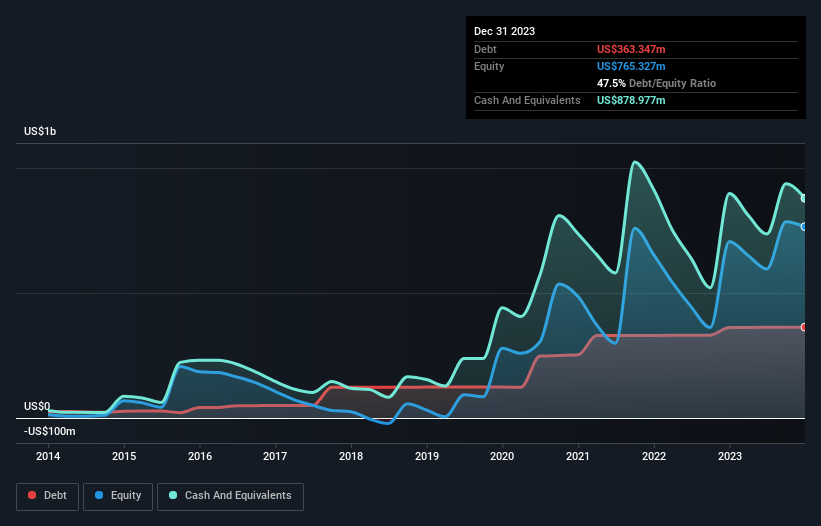
The external fund manager backed by Berkshire Hathaway's Charlie Munger, Li Lu, makes no bones about it when he says 'The biggest investment risk is not the volatility of prices, but whether you will suffer a permanent loss of capital.' So it might be obvious that you need to consider debt, when you think about how risky any given stock is, because too much debt can sink a company. Importantly, Natera, Inc. (NASDAQ:NTRA) does carry debt. But is this debt a concern to shareholders?
When Is Debt Dangerous?
Debt assists a business until the business has trouble paying it off, either with new capital or with free cash flow. In the worst case scenario, a company can go bankrupt if it cannot pay its creditors. However, a more common (but still painful) scenario is that it has to raise new equity capital at a low price, thus permanently diluting shareholders. By replacing dilution, though, debt can be an extremely good tool for businesses that need capital to invest in growth at high rates of return. The first step when considering a company's debt levels is to consider its cash and debt together.
Check out our latest analysis for Natera
How Much Debt Does Natera Carry?
The chart below, which you can click on for greater detail, shows that Natera had US$363.3m in debt in December 2023; about the same as the year before. But on the other hand it also has US$879.0m in cash, leading to a US$515.6m net cash position.

A Look At Natera's Liabilities
The latest balance sheet data shows that Natera had liabilities of US$307.3m due within a year, and liabilities of US$369.1m falling due after that. Offsetting these obligations, it had cash of US$879.0m as well as receivables valued at US$278.3m due within 12 months. So it actually has US$480.9m more liquid assets than total liabilities.
This short term liquidity is a sign that Natera could probably pay off its debt with ease, as its balance sheet is far from stretched. Succinctly put, Natera boasts net cash, so it's fair to say it does not have a heavy debt load! There's no doubt that we learn most about debt from the balance sheet. But it is future earnings, more than anything, that will determine Natera's ability to maintain a healthy balance sheet going forward. So if you're focused on the future you can check out this free report showing analyst profit forecasts.
Over 12 months, Natera reported revenue of US$1.1b, which is a gain of 32%, although it did not report any earnings before interest and tax. With any luck the company will be able to grow its way to profitability.
So How Risky Is Natera?
We have no doubt that loss making companies are, in general, riskier than profitable ones. And we do note that Natera had an earnings before interest and tax (EBIT) loss, over the last year. And over the same period it saw negative free cash outflow of US$286m and booked a US$435m accounting loss. While this does make the company a bit risky, it's important to remember it has net cash of US$515.6m. That means it could keep spending at its current rate for more than two years. Natera's revenue growth shone bright over the last year, so it may well be in a position to turn a profit in due course. Pre-profit companies are often risky, but they can also offer great rewards. The balance sheet is clearly the area to focus on when you are analysing debt. However, not all investment risk resides within the balance sheet - far from it. Be aware that Natera is showing 2 warning signs in our investment analysis , you should know about...
If you're interested in investing in businesses that can grow profits without the burden of debt, then check out this free list of growing businesses that have net cash on the balance sheet.
If you're looking to trade Natera, open an account with the lowest-cost platform trusted by professionals, Interactive Brokers.
With clients in over 200 countries and territories, and access to 160 markets, IBKR lets you trade stocks, options, futures, forex, bonds and funds from a single integrated account.
Enjoy no hidden fees, no account minimums, and FX conversion rates as low as 0.03%, far better than what most brokers offer.
Sponsored ContentValuation is complex, but we're here to simplify it.
Discover if Natera might be undervalued or overvalued with our detailed analysis, featuring fair value estimates, potential risks, dividends, insider trades, and its financial condition.
Access Free AnalysisHave feedback on this article? Concerned about the content? Get in touch with us directly. Alternatively, email editorial-team (at) simplywallst.com.
This article by Simply Wall St is general in nature. We provide commentary based on historical data and analyst forecasts only using an unbiased methodology and our articles are not intended to be financial advice. It does not constitute a recommendation to buy or sell any stock, and does not take account of your objectives, or your financial situation. We aim to bring you long-term focused analysis driven by fundamental data. Note that our analysis may not factor in the latest price-sensitive company announcements or qualitative material. Simply Wall St has no position in any stocks mentioned.
About NasdaqGS:NTRA
Natera
A diagnostics company, provides molecular testing services worldwide.
Flawless balance sheet with reasonable growth potential.


